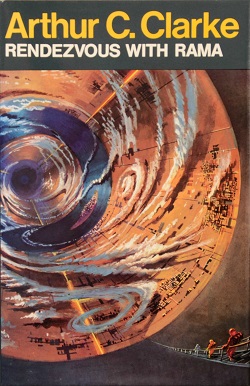Stryder50
Platinum Member
I've a whole range of other ideas and comments to toss for consideration, but when "Oh MammaMamma" came passing through, couldn't help but think how the late and great scientist and sci-fi author, Arthur C. Clark, gave us a hint long ago that something like this might happen.
...
Rendezvous with Rama
Clarke's award-winning novel Rendezvous with Rama (1973) was optioned for filmmaking in the early 21st century[85][86] but this motion picture was in "development hell" as of 2014. In the early 2000s, actor Morgan Freeman expressed his desire to produce a movie based on Rendezvous with Rama. After a drawn-out development process, which Freeman attributed to difficulties in getting financing, it appeared in 2003 that this project might be proceeding, but this was very dubious.[85] The film was to be produced by Freeman's production company, Revelations Entertainment, and David Fincher has been touted on Revelations' Rama web page as far back as 2001 as the film's director.[86] After years of no progress, Fincher stated in an interview in late 2007 (in which he also credited the novel as being influential on the films Alien and Star Trek: The Motion Picture) that he is still attached to helm.[87] Revelations indicated that Stel Pavlou had written the adaptation.
In late 2008, Fincher stated the movie is unlikely to be made. "It looks like it's not going to happen. There's no script and as you know, Morgan Freeman's not in the best of health right now. We've been trying to do it but it's probably not going to happen."[88] In 2010, though, the film was announced as still planned for future production and both Freeman and Fincher mentioned it as still needing a worthy script.[89]
...

 en.wikipedia.org
~~~~~~~~~~~~~~~~~~~~
en.wikipedia.org
~~~~~~~~~~~~~~~~~~~~
Rendezvous with Rama is a science fiction novel by British writer Arthur C. Clarke first published in 1973. Set in the 2130s, the story involves a 50-by-20-kilometre (31 by 12 mi) cylindrical alien starship that enters the Solar System. The story is told from the point of view of a group of human explorers who intercept the ship in an attempt to unlock its mysteries. The novel won both the Hugo[4] and Nebula[5] awards upon its release, and is regarded as one of the cornerstones in Clarke's bibliography. The concept was later extended with several sequels, written by Clarke and Gentry Lee.
...

 en.wikipedia.org
en.wikipedia.org
...
Rendezvous with Rama
Clarke's award-winning novel Rendezvous with Rama (1973) was optioned for filmmaking in the early 21st century[85][86] but this motion picture was in "development hell" as of 2014. In the early 2000s, actor Morgan Freeman expressed his desire to produce a movie based on Rendezvous with Rama. After a drawn-out development process, which Freeman attributed to difficulties in getting financing, it appeared in 2003 that this project might be proceeding, but this was very dubious.[85] The film was to be produced by Freeman's production company, Revelations Entertainment, and David Fincher has been touted on Revelations' Rama web page as far back as 2001 as the film's director.[86] After years of no progress, Fincher stated in an interview in late 2007 (in which he also credited the novel as being influential on the films Alien and Star Trek: The Motion Picture) that he is still attached to helm.[87] Revelations indicated that Stel Pavlou had written the adaptation.
In late 2008, Fincher stated the movie is unlikely to be made. "It looks like it's not going to happen. There's no script and as you know, Morgan Freeman's not in the best of health right now. We've been trying to do it but it's probably not going to happen."[88] In 2010, though, the film was announced as still planned for future production and both Freeman and Fincher mentioned it as still needing a worthy script.[89]
...

Arthur C. Clarke - Wikipedia
Rendezvous with Rama is a science fiction novel by British writer Arthur C. Clarke first published in 1973. Set in the 2130s, the story involves a 50-by-20-kilometre (31 by 12 mi) cylindrical alien starship that enters the Solar System. The story is told from the point of view of a group of human explorers who intercept the ship in an attempt to unlock its mysteries. The novel won both the Hugo[4] and Nebula[5] awards upon its release, and is regarded as one of the cornerstones in Clarke's bibliography. The concept was later extended with several sequels, written by Clarke and Gentry Lee.
...

